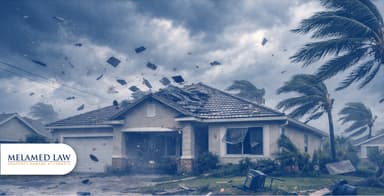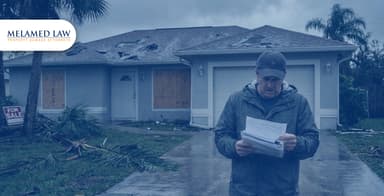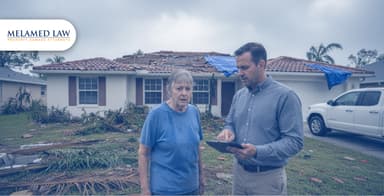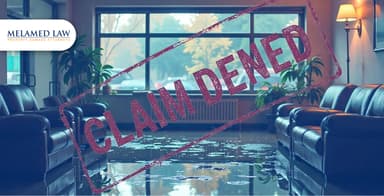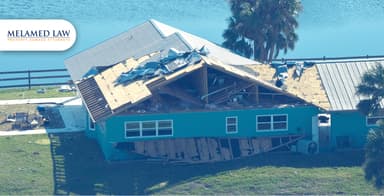
Common Mistakes to Avoid When Filing a Water Damage Claim
When the unexpected happens, we help individuals and businesses collect the money they deserve for their insurance claims.
Melamed Blogs
August 14, 2025
Common Mistakes to Avoid When Filing a Water Damage Claim

You come home after a long day, only to hear that dreaded drip-drip-drip echoing from the hallway. A burst pipe. A leaky water heater. Within minutes, your floors are soaked, your walls are warping, and you're left scrambling to figure out what happens next. Is this even covered?
You’re not alone. Water damage accounts for nearly 29% of all homeowners insurance claims in the U.S., according to the Insurance Information Institute. Filing a water damage claim isn’t just about calling your insurance company. It’s about following the right steps at the right time, also in exactly the right order. One misstep, and you could be facing a denied or drastically underpaid claim.
So how do you protect yourself when the insurance company is more interested in protecting their bottom line than your home? Let’s walk through the mistakes you can’t afford to make.
1) Reporting the damage too late
Time is not on your side when it comes to water damage. The longer you wait to take action, the more you risk jeopardizing your claim both legally and financially. Insurance companies are quick to question delays, and in many cases, they’ll use that hesitation to deny or devalue your payout.
In Florida, property insurance claims need to be filed within a certain time after damage is discovered. If a claim needs to be reopened because the loss turns out to be greater than first believed, there is usually some allowance for that. In cases involving hurricanes, separate rules may come into play.
Still, waiting until the last possible moment is rarely the best approach, even if the policy gives you more time on paper.
If they believe your delay contributed to additional damage (like mold growth or structural deterioration), they may partially or fully deny your claim under the policy’s “prompt notice” clause.
What should you do instead?
The moment you discover water damage:
Take clear, timestamped photos and videos from multiple angles
Write down your observations, such as date, time, and what you saw or heard
Preserve the scene until the insurer or adjuster inspects it
Notify your insurance company immediately (ask your lawyer first, and follow up with written confirmation (email works best for documentation)).
2) Not documenting the damage thoroughly

When it comes to filing a water damage claim, what you can prove matters more than what you say. And unfortunately, many homeowners unintentionally sabotage their claims by failing to document the damage properly from the start.
The moment you discover water damage, you’re essentially entering a legal process. Your photos, receipts, and written notes aren’t just for your own records; they’re the foundation of your claim. Without them, it’s your word against the insurance company’s adjuster. And guess who their loyalty lies with?
Here’s what thorough documentation looks like:
Photos from multiple angles of every affected area, including ceilings, floors, baseboards, and any water-stained furniture or appliances
Videos that show the full scope of the damage, especially if there's active leaking or pooling
Timestamped images if possible, enable location and date info on your phone or camera
A written inventory of damaged items, including approximate value, brand/model, and purchase date
Receipts for any emergency services (plumbers, water extraction, drying equipment, etc.)
Visible mold or mildew growth, which may appear days later, should also be documented and dated
What not to do?
Don’t throw anything away too soon, even if it’s ruined. Your adjuster may need to inspect it.
Don’t clean or repaint walls before getting photo evidence. Covering up the damage can hurt your credibility.
Don’t rely on verbal descriptions over the phone. Always follow up in writing.
3) Misunderstanding what your policy actually covers
One of the biggest traps homeowners fall into is assuming “water damage” means any kind of water-related issue is covered. However, insurance policies don’t work that way, and unfortunately, many people don’t discover that until it’s too late.
The language in your policy matters. And unless you’ve read it carefully (and recently), you may not realize just how many water damage scenarios aren’t covered.
Let’s break it down:
Flood damage? Not covered under standard homeowners insurance. If rising water enters your home from outside, whether from heavy rain, a storm surge, or a nearby river, you’ll need a separate flood insurance policy under the National Flood Insurance Program (NFIP) or a private insurer.
Mold growth? Coverage varies. Some policies cover mold if it’s a direct result of a sudden event (like a burst pipe); otherwise, long-term moisture problems or neglect may lead to a denial.
Slow leaks or hidden damage? Here’s where it gets tricky. If your insurer determines that the leak was gradual from a corroded pipe behind the wall, they may deny your claim. Even if you only recently noticed the damage, the insurer may argue it developed over time and therefore isn’t covered.
4) Repairing everything before the adjuster inspects

After discovering water damage, your first instinct might be to fix everything right away. Clean it up, rip it out, and get your home back to normal. Totally understandable; however, in the eyes of your insurance company, jumping the gun on major repairs can be a costly mistake.
Your policy likely requires you to preserve the condition of the property so the insurance adjuster can inspect the damage firsthand. If you remove wet flooring, tear out drywall, or replace furniture before the insurer has a chance to document it, they may claim there’s not enough evidence to support your claim or, worse, reduce your payout significantly.
That doesn’t mean you have to let the damage get worse. Your duty under most policies is to prevent further loss, and having a skilled legal guide
Melamed Law helps Florida homeowners who’ve had their claims delayed, underpaid, or unfairly denied. Especially when insurance companies blame the homeowner for trying to fix the damage too soon. If your insurer is making excuses instead of honoring your policy, Melamed Law is prepared to step in, protect your rights, and fight for the full compensation you’re entitled to.
5) Accepting a lowball settlement without negotiating
You’ve waited weeks. Maybe even months. And finally your insurer comes back with a number. However, it’s… laughably low. Still, you're tired. Overwhelmed. You just want to move on.
That’s exactly what the insurance company is counting on.
Lowball offers are one of the oldest tricks in the book. They’ll offer just enough to tempt you, hoping you won’t question the fine print, push back, or hire someone to review it. However, accepting that first check without understanding what you’re signing can leave you footing the bill for repairs that should’ve been covered.
Here’s what you need to know:
Once you accept a settlement and sign a release, your claim is likely closed even if new damage is discovered later.
You have every right to request a detailed breakdown of how your insurer calculated their offer.
Florida law requires insurers to act in good faith. If they’re stalling, underpaying, or ignoring valid documentation, you don’t have to accept it.
Sound unbelievable? It’s not. We review insurance settlements, challenge lowball tactics, and negotiate with your best interests, not the insurer’s, in mind. We know the language they use, the loopholes they hide behind, and the pressure they apply. And we’re not afraid to push back hard.
You don’t have to be grateful for scraps. If your insurance company isn’t honoring your policy, let us help you demand what’s fair.
Finally, Going through the process without professional help

Handling a water damage claim by yourself might seem like the easiest way to save time and money. However, insurance companies know exactly how to use that against you. The truth is, you don’t have to go through this on your own. Public adjusters, legal experts, and contractors bring years of experience and insider knowledge to the table.
They understand the true value of your claim, know how to spot unfair tactics, and can push back against insurers who try to lowball or delay your settlement. And when it comes to expert legal support, Melamed Law stands out as one of Florida’s most trusted advocates for homeowners facing property damage claims.
Our deep knowledge of Florida insurance law and a track record of successful cases mean we don’t just handle paperwork; we fight fiercely to protect your rights and maximize your recovery. Schedule your free consultation now by submitting this form.
Recent Cases


